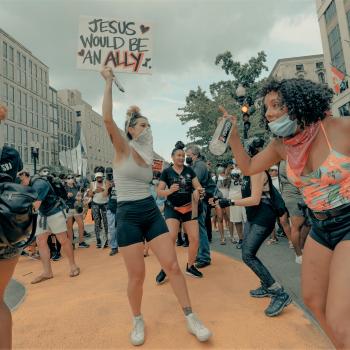In recent months, I have had more race-related conversations than I thought was possible in such a short amount of time. Like it or not, it is the dominating subject matter in all walks of life. People within the church are not the only ones grappling with how to navigate the current events—which would make one think that the world itself is facing a time of unparalleled and unbridled racism. Despite the tendency for the conversation to segue toward race relations though, this actually isn’t the case. Racism still rears its ugly head, no doubt. It isn’t as if this sin is the one exception to the many sins which plague humanity. Yet the way many speak on issues of race in the church today is as if it is single-handedly the sin which the majority of people, particularly white Evangelicals, are guilty of committing. Rather than giving concrete examples of particular, explicit forms of racism that need to be repented of, many cite the implicit racism in place in various systems and people groups, which they argue is at fault for any number of perceived social issues.
Even within the church, from amongst our own “tribe” of biblically conservative thinkers, the charge is often lobbied against brothers and sisters in Christ that they are guilty of some sort of implicit racism. For those unaware of what implicit racism is, the basic premise is that despite your best intentions, you hold stereotypes and assumptions about people groups, which informs every aspect of your life. Now, not all stereotypes and assumptions are said to be bad, but many of them are, and these negative portrayals inform how you interact with people of color. Implicit bias can be said to manifest itself in explicit bias, but the biases themselves lie under the surface and are often more undetectable to people, which simply means that “what’s on the inside” comes out in ways that continue to favor whites instead of minority people groups—even if unintentional.
When this happens on a larger, national scale, you get the doctrine of systemic racism. In essence, implicit racism is that which lives deep down in your subconscious and inevitably informs how you interact with people of different genders, ethnicities, religious affiliations, etc. If you are a straight, white male, you are at the top of the power matrix and invariably relate to all other groups with some sort of implicit bias. You can’t help it, nor even necessarily become aware of it, because your subconscious drives these impulses—that’s the whole point. You are de facto guilty of implicit racism simply by virtue of who you are as the dominate people group. It is part of your make-up as a person in the existing power structure you find yourself in. While other people groups are said to hold some implicit bias, it shows up in larger measure in whites.
The problem with this entire line of thinking is that it assumes from the start that this is the case—a tactic I find is emblematic of social justice proponents. They start with the proposition that everyone has implicit biases, and whites are predominately favored positively whereas other minorities are disproportionately treated unfairly. Part of the reason this assumption is virtually granted today is due to a test (which is now a series of tests) popularized by Project Implicit, called the Implicit Association Test. Like the name suggests, the tool is designed to show implicit bias through associations (i.e. word and picture association). It has seen no shortage of controversy over its accuracy since its debut in 1998—but most don’t know that despite this controversy, the tool is widely used to support the ideas of systemic racism, the gender pay gap, police brutality, and yes, implicit racism amongst whites in particular. If you go to read anything on implicit bias, and I do mean anything, this study comes up.
The tool has also been the impetus of seminars and other related trainings, which has become a multi-million dollar industry all of its own, despite even the Implicit Association Test creator’s hesitancy to affirm these can be meaningful resources to counteract purported implicit bias. But the rather obvious question to ask is that if the test itself is flawed—why is the nation using this as a metric to solve the issue of racism? The second question is that if the creator of the test, Anthony Greenwald, is leery of saying diversity or implicit bias training programs are effective, why are people like Robin DiAngelo and Ibram X. Kendi making hand over fist in this industry? Well, perhaps one reason is as simple as Greenwald suggests, in that he sees, “…most implicit bias training as window dressing that looks good both internally to an organization and externally, as if you’re concerned and trying to do something. But it can be deployed without actually achieving anything, which makes it in fact counterproductive. After 10 years of doing this stuff and nobody reporting data, I think the logical conclusion is that if it was working, we would have heard about it.”
My honest assessment of the movement as it currently stands is that it is designed to be an emotionally manipulative tool in order to perpetuate guilt through racial animus. The reason for this is that for one, it has become an incredibly lucrative field for those who can milk it for all its worth, but for two, nobody wants to be on the wrong side of the cancel culture. Another way one might put it is that you’re being played. Where I believe this to be a foundationally incorrect issue though is in the proposition that one is predisposed to certain biases as a result of underlying factors of the subconscious. This is not to say that biases and prejudices don’t exist, but rather, biases are not relegated to the nebulous realm of the subconscious, but instead are volitional beliefs. When you relegate bias to the subconscious, you are preserving, by design, a system of thought that allows little to no room for people to actually correct such biases because they are implicit rather than explicit.
Now, for the sake of the argument at hand, I am simply going to grant that implicit racism is a genuine problem that people need to deal with. Let’s run a thought-experiment and say that the results of the test are accurate—that as many as 70-75% of Americans hold implicit bias against another people group. Let’s further grant that whites in particular have a greater tendency toward implicit racism, as the Implicit Association Test suggests. This, by the way, isn’t an outlandish hypothetical, namely because this, and/or other similar lines of reasoning, are what is commonly suggested by critical race theorists and social justice proponents alike—even amongst more conservative Evangelical thought-leaders such as Thabiti Anyabwile, Eric Mason, Matt Chandler, Paul David Tripp, Russell Moore, David Platt, Jarvis Williams, etc. This is where we get concepts integrated into the church like white privilege, generational guilt, systemic racism, and even how many frame their understanding of things like “justice” or the gospel itself.
In the case that implicit racism is a genuine issue though, we would be bound to acknowledge that implicit racism, whether a product of the subconscious or not, is sin. The reason this would be considered sinful is fairly self-evident, in that it is the sin of partiality (Ja. 2:1-13). Partiality can manifest itself in many ugly ways, not the least of which being along lines of power, wealth, gender, and even ethnicity—but in whatever way it becomes manifest, it is sin, even if one commits it unwittingly (Ps. 19:12). Unknown or unintentional sin does not become less sinful, despite the fact that we might be able to be more sympathetic to the one unknowingly caught in sin. Sin is all that falls short of God’s standard. Sin is a matter of a wicked heart (Matt. 15:19), but the sin of partiality betrays the reality of God creating all people in His image, and the cross in unifying all Christians as one in Christ (Gen. 1:27; 1 Cor. 6:7). Furthermore, partiality violates the principle of equity before the Law of God, and therefore, makes the partial one the hypocrite on whom God pronounces woe (Rom. 2:1-16). Perhaps most severely, partiality is fundamentally divisive, as it seeks to undermine the unity of the Body, and thereby, requires the church be all the more diligent in rejecting the self-condemned, factious man (Tit. 3:10-11).
The point being: partiality is no matter of indifference, especially for the professing Christian. It requires us to speedily deal with the sin at hand simply because it undermines the very foundations of humanity wrought in Creation, yet simultaneously, the blood-bought unity of the church. It makes a mockery of the cross, as it is seen as the unifier of all people groups. In this, if implicit racism is sin and we are to take sin as seriously as it demands, by necessity, the one who is implicitly partial must be brought to repentance. We would be bound, per the principles of Matt. 18:15-20, to confront them, and walk them through the necessary stages of church discipline—even to excommunication if need be. But here is particularly where this all gets incredibly dicey and ultimately becomes stretched to absurdity.
The foundation of repentance in Scripture is built off of the presupposition of explicit sin. Even that which remains within the heart, though hidden from man, is not shrouded in mystery in what it actually is in substance. David’s own plea for forgiveness from “sins of ignorance” displays that even though he may not be aware of what is transpiring inwardly, God nonetheless is and can reveal it so that a proper sin offering could be made (Lev. 4:28). This is all born out of a proper recognition of the application of the Law and the Gospel, in that the Law serves to highlight one’s sin before a holy and just God’s perfect standard. To put it more clearly: sin may not be known to you, but it is to God, and it is exposed by the Law and even in natural revelation (Rom. 1:18-20; 7:7-13). Secondly, matters of the heart never stay matters of the heart. What I mean by this is that sin itself cannot stay hidden, even to the individual who unwittingly commits it. While everyone who does evil does not come into the light for fear his deeds will be revealed—everything which is hidden will be brought to light and made visible to all (Jn. 3:20; Eph. 5:12-13). In other words: God is clearly in the business of revealing sin, for both the believer and the unbeliever alike.
The difficulty with implicit racism, of course, is in being able to ascribe any particular, explicit examples of this sin, namely because by definition it cannot be explicit, since it is implicit. The entire premise behind implicit racism is that it is implicit and remains so, otherwise it wouldn’t be implicit any longer. To make that more clear: implicit racism hinges off of the idea that it cannot be easily known, seen, or evidenced, and therefore, remains less controllable. Per Scripture, sin is explicit. There’s really no way around this from the teaching of the Bible, in that while it may remain hidden for a season, it is still by nature and practice, sin, and all such sin is revealed. For the Christian, the notion of implicit racism poses some rather obvious contradictions with what the Scriptures state on the nature and duration of hidden sin, yet simultaneously, the ability one has to repent. If implicit racism is a genuine issue, meaning it is genuinely sin, it demands genuine repentance. If, however, it is not easily identified, known, or defined, we have some very real problems squaring those two things together. Thus, we’re forced to choose between two competing principles at play: 1.) the necessity of repentance, and 2.) the validity of implicit racism.
What I believe accounts for much of this is that people in the church are placing far too much stock in Jungian and Freudian principles, and vicariously, they are critiquing things from outside of the purview of a biblical worldview. In other words: you’ve already made a conscious decision to place more trust in something outside of the biblical witness, and thereby, place this resource in an authoritative position over the text. A tool that psychologists and the scientific community cannot even agree upon the accuracy of for a plethora of reasons has inadvertently been accepted at face value in society, and to an undiscerning church who isn’t even necessarily aware of where these ideas originate (and this is just one such instance, mind you). Part of the simple reason for this is as Greenwald suggested, in that it looks good—and in a climate such as ours, no one wants to look bad. It is easier to account for innate biases in people to fit a particular narrative, than to produce tangible, concrete evidence of widespread racism. It is easier to believe we have a culture that assumes nearly every structure in existence has inadvertently racist undertones, people’s subconscious are inherently motivated by prejudice, and racism exists behind every modern problem, than to accept that the problem is endemic. Can there be structural problems? Of course; this is clearly evidenced in chattel slavery and even in Jim Crow laws, among many other things like the welfare state. Again, these are explicit examples of partiality. What we are dealing with is the charge of implicit bias under-girding every institution in America, largely on the bases of an entire ethnic group’s participation in these institutions.
When you look at the world like this, what we are left with then is the assumption that actions are automatically motivated by racial animus, which is in essence, slander or bearing false witness because there is no possible way to know this from a surface-level examination. People are reading intention and motive into scenarios based off of faulty science, and thereby assigning racial motivations to things that may not be racially motivated. Surely, some of them may be so, but that does not necessitate that current laws in place are purposed to perpetuate discrimination against minorities and favor whites, that every police shooting of a black man is racially motivated, nor does it mean normal day-to-day interactions between average Americans are innately tainted by race-based discriminations in the subconscious. People are making the leap to say that they can judge the thoughts and motives of the heart by assuming as much—and this should be rejected by all Christians unanimously for obvious reasons, not the least of which being that God Himself is the one who weighs the heart.
Yet the thing that makes such judgments altogether more perilous is that they are subjectively based value judgments. They assign a particular perception as reality, and become inarguable because you can’t tell someone how their perception of reality itself is not correct. What I mean by this is that one person’s understanding of what happened does not automatically render their account to be factual, nor does another person’s perception of that person’s account. In order for something to be considered factual, we need to go beyond the subjective measures of intuition, or gut feelings. To put it as clearly as possible: unless we have explicit reason to believe that something is racially motivated, we ought to be extremely hesitant to place something in that category. What happened may have been wrong; it may have even been an injustice according to the Law—but unless we can explicitly point out partiality, we ought to drop the rhetoric.
If we are to call out actual instances of partiality, we must be sure we can substantiate our claims beyond the theoretical realm of implicit racial bias. In other words: we must be able to point to explicit sins, specifically in this case, ones where racial animus is overtly clear. Nothing productive comes from saying people have implicit biases for a number of reasons, not the least of which being that it actually doesn’t do anything to deal with the issues of ethnocentrism, or more plainly, the sin of partiality. What we have to deal with are specific acts of partiality. One rather glaring inconsistency I see on behalf of social justice proponents is an unwillingness to give specifics; specific sins of specific people and specific ministries, or specific and current laws and practices on the books that perpetuate systemic racism. What I mean by this is not in how something may be perceived, but how it is demonstrably so.
That means if we are to come to the table with the charge of racism, we must be able to demonstrate that it is clearly so, otherwise we are slandering, bearing false witness, and likely even being found guilty of the very same crime we are seeking to denounce: partiality against a particular people group. It likewise means that you can’t watch a video on social media and immediately weight the motivations and intent of the person. It means when evidence to the contrary is brought forth, we accept it, rather than perpetuate a lie that says it was unjustified, racially motivated, or whatever else the popular, but untruthful narrative might be. To put it most clearly: it means we are a people beholden to the truth of all things because we are a people who love the truth, which very simply means that if we can’t demonstrate actual, substantiated evidence of racial prejudice, we need to drop the race-baiting rhetoric and stick to the facts. What ought to motivate us beyond any other thing should be the truth, even when standing for the truth causes us to be misrepresented and slandered by those who do not see things under the constraints of a biblical worldview.













